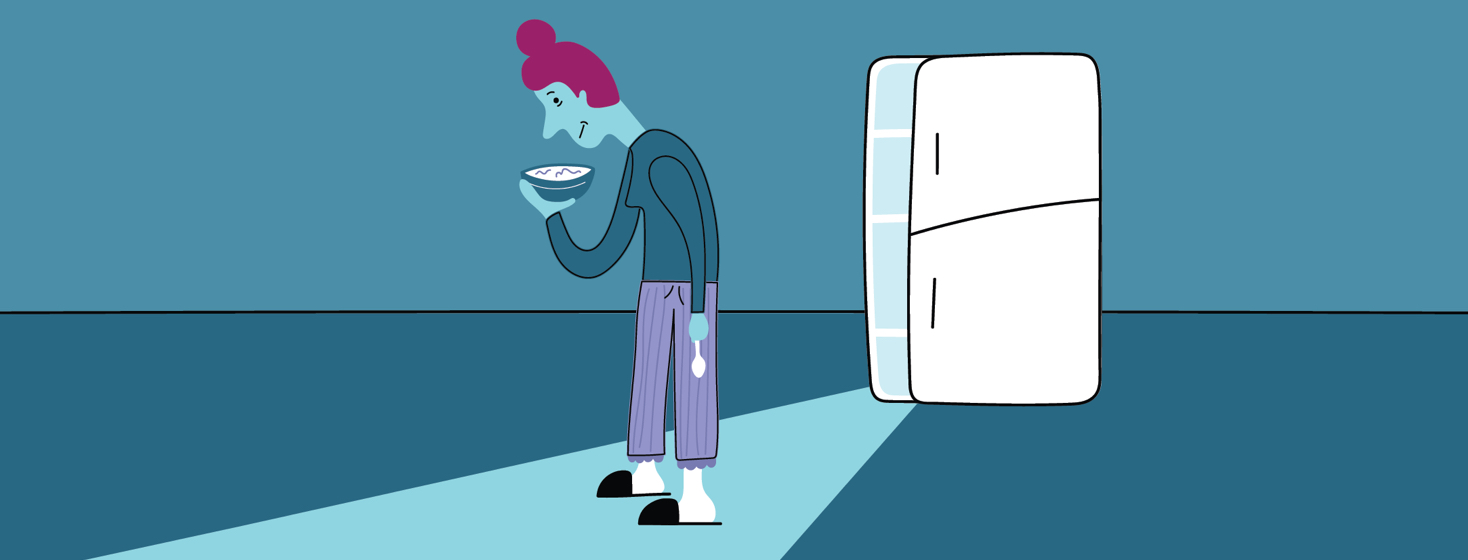Feeding Fatigue
I have many, many years experience with both restless legs syndrome (RLS) and chronic insomnia. So you would think with all that practice I would be smart at managing the symptoms by now. I’m not. When I get tired and fidgety I eat.
Feeling bad in the long run
Feeding fatigue with food feels good in the moment but not in the long run. And yet after years of feeling bad in the long run, I find myself continuing to pace to and from the pantry when drooping eyelids weigh me down.
Carbohydrates give an instant hit of energy and my body seems to know in advance that a bowl of cereal will boost me through the midnight hours. Sugar, salt, and fat feel like my best friends when exhaustion is oozing through my veins.
Not simply a bad habit
It’s not just a bad habit though. There are physical reasons why my hand silently reaches for toast at 2 AM. When we’re tired, the hunger hormone, ghrelin, increases. While leptin, the hormone that indicates fullness, is reduced. The body is practically saying, feed me. And I feed it.
Reprieve and comfort
Fatigue is not the only thing satiated by leftover pie in the wee hours of the morning. An exhausted body that can’t keep still welcomes the familiar walk from couch to fridge. The excuse to get up and move offers momentary reprieve from the incessant movement of restless legs. And the action of the spoon from bowl to lips is sufficient distraction to ease the legs for a very short while.
Not to mention comfort. Comfort food is well named. The delicious tidbits I like to think of as occasional treats during the day, become the open arms of a long-lost lover when the loneliness of 3 AM rolls around. A bowl of muesli my new best friend.
What foods are known for soothing?
Food feeds my fatigue and when night-time pacing is wearing me down I often give in to the urge. Food can also be my friend though. While some foods are known to exacerbate insomnia – caffeine and alcohol the most well-known triggers – others have a reputation for soothing. I haven’t found anything that behaves like a sedative but every little bit of calm is a bonus.
Melatonin, serotonin, and tryptophan
Melatonin and serotonin are important components of the sleep-wake cycle and the amino acid tryptophan is known to boost levels, contributing to improved sleep overall.1
Nutmeg releases serotonin and milk is a source of tryptophan, so the old remedy of hot milk with nutmeg before bedtime is not entirely an old wive’s tale.
Kiwi fruit and sour cherries are also sources of serotonin and tryptophan and make for better midnight snacks than cookies and crackers.
Nuts and fatty fish can be a rich source of fatty acids, magnesium, zinc, and melatonin. Increasing these foods is a way of supporting good sleep.
Know your body
Personally, I have found that melatonin supplements irritate my RLS, but food sources rich in melatonin do not. It is pretty important to become familiar with our individual responses to food and supplements.
Then of course there’s good old chamomile tea – well known for its calming effect due to the antioxidant, apigenin.2
Reaching for a calmer alternative?
Midnight snacking is not an essential component of sleepless and restless nights, but it’s a common occurrence. Common for me at any rate. Maintaining a food and sleep diary can identify both potential triggers and foods that improve sleep.
While instinct heads to the food that increases energy, logic says I should be searching for the calmer alternatives. Perhaps a sour cherry smoothie and a handful of almonds is a smarter option when it comes to pantry raiding at 4 AM.

Join the conversation